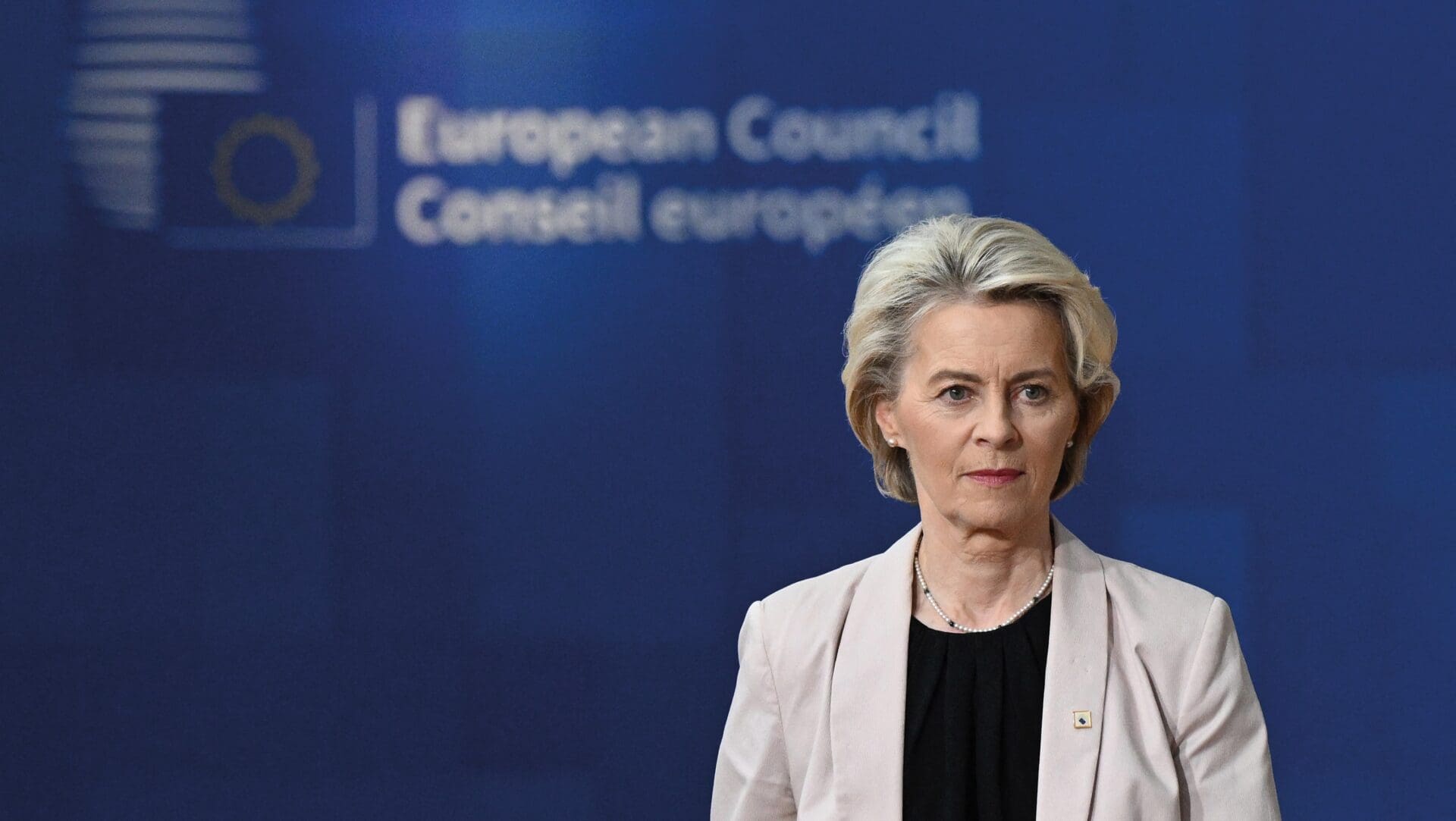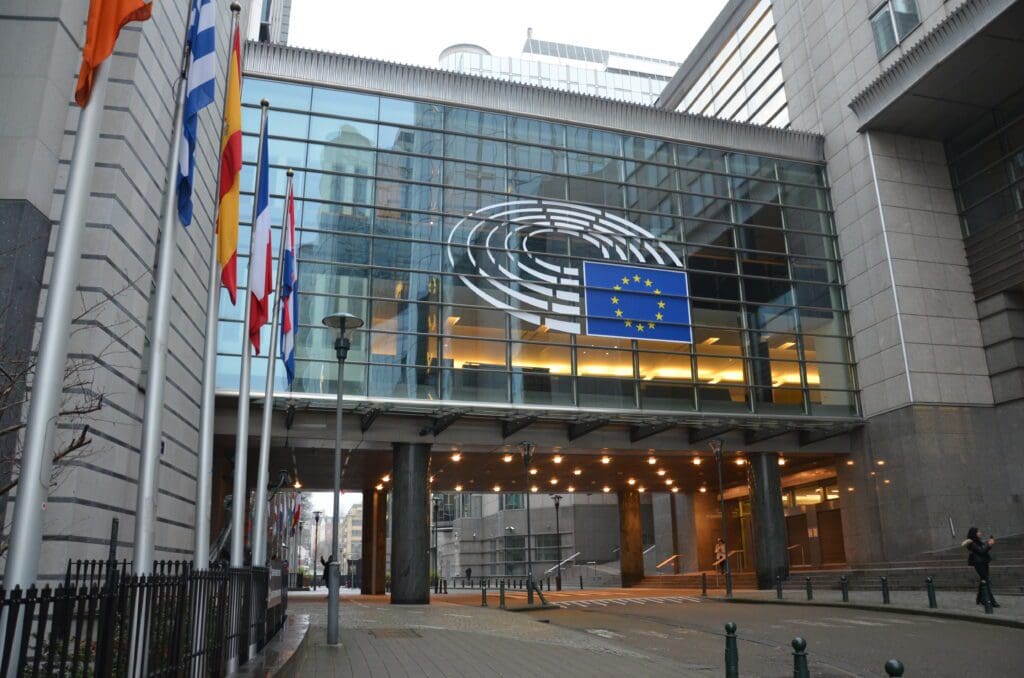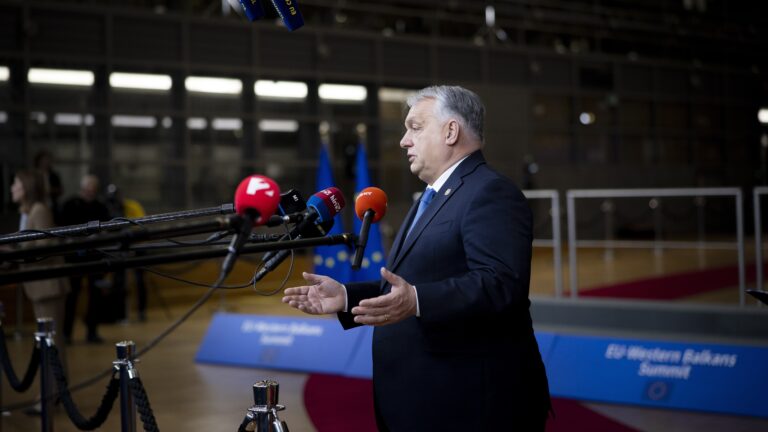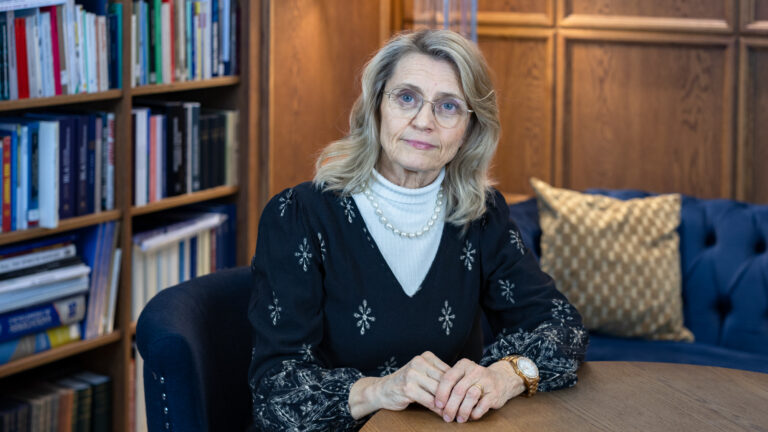This article was published in our print edition’s Special Issue on the European Union.
Ursula von der Leyen has the twelve stars of the EU flag fluttering around her head like a halo in a medieval painting—can anyone have missed these photographs? The president of the European Commission is photographed this way almost every time she addresses the plenary of the European Parliament (EP). It is the perfect setting for a politician who has done almost everything in recent years to move beyond the shadows of her failure-strewn political past—and to become symbolically one with the European project, or what is left of it. Angela Merkel’s former failed defence minister dutifully gave in to the Brussels Bubble, which in return put her on the political world map—and now she aims to continue what she has been doing for the past five years.
‘The history of European integration is in fact nothing more than the history of the power struggle of the EU institutions’
Perhaps better than anything else, a pithy saying in the German language describes von der Leyen’s political career: Mehr Schein als Sein, or ‘appearance over substance’. It is now almost twenty-one years since the current president of the Commission had the greatest electoral success of her career: in 2003, she won an individual mandate in the Lower Saxony Landtag.1 Ursula von der Leyen has not won a single election since then: she failed to secure her own seat in the German Bundestag, despite campaigning as a nationally known minister in her Hanover constituency from 2009,2 and was notoriously unseated in 2019 as her compatriot Manfred Weber, the European People’s Party (EPP) list leader, was ousted after the European elections—and because her former ministerial activities had become unacceptable even to the Grand Coalition, which traditionally treats defence as an afterthought.3
Despite being elected by a relatively narrow majority of MEPs to head the European Commission,4 von der Leyen quickly found her voice in her new position, defying the expectations of those who had expected her to be more manageable as a compromise candidate. From the start, however, the new president surrounded herself with a narrow group of advisers who have gone on to assist her on matters ranging from key EU issues to optimizing content on her social media channels5—often with a complete lack of transparency, despite von der Leyen’s promise to be more open.6 Of course, this may also have been necessary because von der Leyen had never held such a high office before—nor has her political career been one of unblemished success—but in any case, the new image of the new president of the European Commission quickly began to emerge: an omnipresent, ever-moving Ursula who spends her days and nights with the EU. And that quite literally, since von der Leyen has actually moved into the thirteenth floor of Berlaymont. In this respect, it is perhaps not an exaggeration to say that she has been in campaign mode since 2019.
‘The powers of the institutions at the core of the current EU have been in a constant state of flux since the beginning of the European project’
In 2019, von der Leyen set out six ambitious objectives for her presidency, such as the digitalization of the EU, the protection of the European way of life (which at the time was also understood to mean the European Rule of Law Mechanism7 and the launch of the European Public Prosecutor’s Office8), the extension of the powers of the European Parliament,9 and the development of the European Green Deal, which is supposed to make the EU climate neutral by 2050.10 It is interesting in itself, although not surprising, that von der Leyen—the candidate of the EPP, a theoretically centre-right political bloc, and herself a member of the theoretically centre-right Christian Democratic Union (CDU)—has made such issues, which are particularly dear to the European left, the focus of her presidential candidacy. Similarly, the key points in von der Leyen’s programme all seem to be aimed at measures that ultimately serve to extend the powers of the EU institutions, and in particular those of the European Commission.
To use slight Marxist terminology, I might add that the history of European integration is in fact nothing more than the history of the power struggle of the EU institutions. The powers of the institutions at the core of the current EU have been in a constant state of flux since the beginning of the European project, largely due not to the actual content of the founding treaties that created them and govern their operation, but to their application and interpretation. This is something that any university student who comes into contact with EU law, even superficially, in the course of their studies, will learn. The politicians who lead the member states are well aware that European integration has always involved a transfer of sovereignty, which is often very convenient for the nation states, but often more like signing a blank cheque, the total amount of which is only revealed when it cannot be returned. The process seems to be unstoppable: in practice, the Court of Justice of the European Union—whose case law notoriously supersedes nation-state constitutions in the European legislative hierarchy—rarely rules against the over-expansionist tendencies of the European institutions, which are also only partially protected against by the principles of subsidiarity and proportionality11 enshrined in the Treaty on European Union (TEU).
In essence, there can be only one possible outcome of the above dynamics: the institutional hierarchy of power established by the treaties will be overturned. This does not mean that the EU will necessarily and irreversibly fall into decay. Take the EP for example: the institution with the second greatest democratic legitimacy in the Union could only become a relevant actor as a result of a similar process,12 which has not so far proved fatal for the EU.
Of course, the role and powers of the EP are clearly defined in the current treaties. In addition to its direct representative function,13 the TEU confers legislative and budgetary tasks on the EP, which the latter must perform jointly with the Council, composed of the ministers of the member states.14 However, the EP’s legislative autonomy is very limited: under the current rules, it cannot initiate legislation, which is primarily the responsibility of the Commission. The EP can currently propose legislation indirectly15 under the Treaty on the Functioning of the European Union (TFEU), but in her programme, von der Leyen offered the institution more: she assured the EP that she would support its future autonomy to initiate legislation.16
This idea would of course require a treaty amendment, but the proposal is not remarkable for that reason alone: it would also bring a radical change in the status quo of power in the EU (and, unsurprisingly, not in favour of the national governments), and it came from the very person who, once elected, would have had to personally guarantee the proper application of the treaties17—which this proposal would have made impossible in itself. Von der Leyen must, of course, have had good reasons for putting forward this idea. On the one hand, if the EP were able to initiate legislation on its own, the procedure under Article 225 TFEU could be bypassed, thus speeding up the legislative process. On the other hand, the TEU makes it clear that the Commission must work to promote the ‘general interest’ of the Union18—but the EU’s priorities are still set by the European Council, composed of the heads of state or government of the member states.19 But the EP, as the directly elected representative body of the Union, is not bound by the priorities of national governments, so if it could initiate legislation on its own, it would bypass the nation-states as ‘obstacles’, and the EU could finally act in its own self-interest.
During her first term, von der Leyen has repeatedly demonstrated that, as president of the European Commission, which is seen as a ‘guardian of the treaties’, she takes these treaties rather as a guide, and is not shy about going beyond her remit. All of this, of course, helps enormously in creating and maintaining the desired image of ‘omnipresent Ursula’: thanks to endless social media campaigns built by professional consultants, Europeans can put a face to the opaque and often self-serving mass of the EU, and perhaps even international partners are able to answer the decades-old question: who do you call when you want to talk to Europe? Von der Leyen says it is von der Leyen.
‘[Von der Leyen] was only able to become Commission president because her predecessor was turned down by European leaders at the last minute’
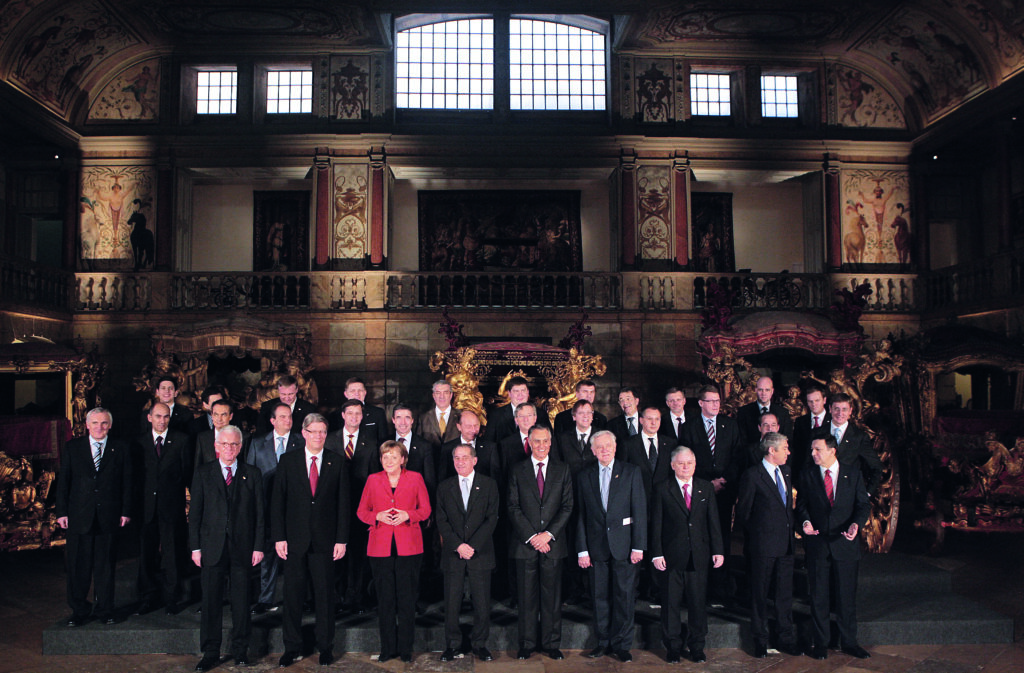
However, not everyone is happy with this response20—nor with the way von der Leyen has ultimately transformed herself into a ‘leader’ of the EU. While during the emergency months of the COVID-19 pandemic, the leading politicians of member states were busy with crisis management at home, von der Leyen and the European Commission—in a very satisfactory way—focused on pan-European disease management and coordination of vaccine procurement. The motto: coordinated vaccine procurement would prevent European countries from robbing jabs from each other. With her excellent Washington connections, von der Leyen personally brokered part of the deal with US Pfizer executives—even though there was a complicated format for negotiating including all member states—which resulted in the EU acquiring 900 million Pfizer vaccines at a hefty price. But such quantities were not necessary, and the Commission president was later unable to publish, on request, the messages she had exchanged with the drug company bosses.21
However, ‘omnipresent Ursula’ did not have to bother much with critical questions. By the time the costs of her intervention had become apparent, the attention of national leaders was already focused on the next crisis: the escalation of the Russia–Ukraine War. The European Commission, with von der Leyen at the helm, quickly took the initiative on the issue of retaliation: it prepared a series of sanctions packages against Russia, in no small part at the ‘suggestion’ of the US, but the exact contents were not communicated to the leaders of the member states until they were put to a vote, leaving the governments of the European countries in a precarious position, allegedly because the Commission feared leaks.22 The scenario was similar to the vaccine case: in response to an acute crisis, von der Leyen and the Commission went over the heads of member states to create a situation in which the Council had essentially no choice but to accept the Brussels agenda.
The fact is that von der Leyen’s private actions have contributed greatly to the myth that the Commission is the ‘government’ of the EU, and that its president is therefore a kind of head of government—but they do not make it true. Within the EU, von der Leyen’s eccentricity is causing increasing tension. ‘She has increasingly been behaving like a queen’, an EU diplomat recently complained to Politico, saying that von der Leyen regularly oversteps her authority, only consults her own advisers, does not answer questions, and often only informs member state representatives about decisions, instead of discussing them.23
National governments are not the only discontented actors here. The EPP elected von der Leyen as its Spitzenkandidat at its March congress in Bucharest,24 but with nowhere near the support that would have been expected from a successful Commission president aiming for a second-term.25 ‘Despite her qualities, Ursula von der Leyen has been outvoted by her own party’, Thierry Breton, one of von der Leyen’s commissioners, posted on Twitter in response to the result,26 suggesting that the support for the current President is not unanimous even among commissioners.
Von der Leyen knows better than anyone exactly how little it means to be elected as a Spitzenkandidat; after all, she was only able to become Commission president because her predecessor was turned down by European leaders at the last minute. But will von der Leyen also be rejected? That seems unlikely at the moment, but it is not the European Council she should be worried about in the first place. Polls suggest that the Identity and Democracy bloc of radical right-wing parties could form the third largest group in the European Parliament after the elections, but the conservative ECR could also have more seats than it did five years ago—especially if Hungary’s Fidesz joins the group. In light of this, there is a good chance that the next European Parliament will not be nearly as hands-off with von der Leyen as the current one.
‘Omnipresent Ursula’ therefore faces a challenging campaign, which will not be easy to pull off flawlessly, even though—as I have already pointed out—von der Leyen has been campaigning virtually non-stop for the last five years with one of Europe’s most skilled teams of advisers behind her. Von der Leyen will also have to make gestures to the governments of the member states and to her own bloc: she will have to convince them that she will be more willing to cooperate and less self-indulgent in her next term, in order to appease the malcontents at this critical time. Only five years from now will we be able to say whether, if elected, she has kept those promises. What is already certain is that Pandora’s Box has been opened: for five years, the EU, operating under the Lisbon Treaty, has tolerated a Commission president who has unthinkingly ignored both the member states and the Treaties in her own interests of the moment. And many more are likely to follow.
NOTES
1 Landesbetrieb für Statistik und Kommunikationstechnologie Niedersachsen, Amtliches Ergebnis der Landtagswahl am 02.02.2023 in Niedersachsen. Wahlkreis: 039 Lehrte (State Office for Statistics and Communication Technology Lower Saxony: Official Results of the State Elections on 2 February 2023 in Lower Saxony. Constituency: 039), www.nls.niedersachsen.de/LW2003/039.htm, accessed 20 March 2024.
2 Landesbetrieb für Statistik und Kommunikationstechnologie Niedersachsen, Amtliches Endergebnis der Bundestagswahl am 27. September 2009. Wahlkreis: 43 – Stadt Hannover II. (State Office for Statistics and Communication Technology Lower Saxony, Official Final Results of the Federal Election on 27 September 2009. Constituency: 43 – City of Hanover II.), www.nls.niedersachsen.de/BW2009/43.htm, accessed 20 March 2024; Die Bundeswahlleiterin, Bundestagswahl 2013, Ergebnisse, Niedersachsen, 042: Stadt Hannover II. (The Federal Returning Officer: Federal Election 2013, Results, Lower Saxony, 042: City of Hanover II.), www.bundeswahlleiterin.de/bundestagswahlen/2013/ergebnisse/bund-99/land-3/wahlkreis-42.html#elected3008, accessed 20 March 2024; Die Bundeswahlleiterin, Bundestagswahl 2017, Ergebnisse, Niedersachsen, 042: Stadt Hannover II. (The Federal Returning Officer: Federal Election 2017, Results, Lower Saxony, 042: City of Hanover II.), www.bundeswahlleiterin.de/bundestagswahlen/2017/ergebnisse/bund-99/land-3/wahlkreis-42.html, accessed 20 March 2024.
3 Georg Ismar and Albrecht Meier, ‘Von der Leyen tritt am Mittwoch als Verteidigungsministerin zurück’ (Von der Leyen Will Resign as Defense Minister on Wednesday), Der Tagesspiegel (15 July 2019), www.tagesspiegel.de/politik/von-der-leyen-tritt-am-mittwoch-als-verteidigungsministerin-zuruck-5026360.html, accessed 20 March 2024.
4 EEAS, ‘Parliament Elects Ursula von der Leyen as First Female Commission President. Brussels, 16 July 2019’, www.eeas.europa.eu/node/65512_en, accessed 20 March 2024.
5 Cristina Gonzalez, ‘Von der Leyen Personally Pays PR Firm for Social Media Advice’, Politico (24 April 2020), www.politico.eu/article/von-der-leyen-personally-pays-pr-firm-for-social-media-advice/, accessed 20 March 2024.
6 Ursula von der Leyen, ‘A Union that Strives for More: My Agenda for Europe. Political Guidelines for the Next European Commission’, European Commission (April 2019), https://commission.europa.eu/system/files/2020-04/political-guidelines-next-commission_en_0.pdf, accessed 20 March 2024.
7 Von der Leyen, ‘A Union that Strives for More’, 14.
8 Von der Leyen, ‘A Union that Strives for More’, 16.
9 Von der Leyen, ‘A Union that Strives for More’, 20.
10 Von der Leyen, ‘A Union that Strives for More’, 15.
11 Article 5(2), (3), (4) TEU.
12 The European Parliament was not part of the Schuman plan, and its members were not directly elected until 1979.
13 Article 10(2) TEU.
14 Article 14(1) TEU.
15 Article 225 TFEU.
16 Von der Leyen, ‘A Union that Strives for More’, 20.
17 Article 17(1) TEU.
18 Article 17(1) TEU.
19 Article 15(1) TEU.
20 In the words of Hungarian Prime Minister Viktor Orbán: ‘We think of her and we read her words as if a leader of Europe was speaking—when in fact she is our employee, our paid employee, whose job it is to carry out what we decide.’ Viktor Orbán, ‘Speech at the jubilee celebration for the weekly magazine Weltwoche” About Hungary (November 2023), https://abouthungary.hu/speeches-and-remarks/speech-by-prime-minister-viktor-orban-at-the-jubilee-celebration-for-the-weekly-magazine-weltwoche, accessed 28 March 2024.
21 ‘EU’s von der Leyen Can’t Find Texts with Pfizer Chief on Vaccine Deal-Letter’, Reuters (29 June 2022), www.reuters.com/world/europe/eus-von-der-leyen-cant-find-texts-with-pfizer-chief-vaccine-deal-letter-2022-06-29/, accessed 22 March 2024.
22 Suzanne Lynch and Ilya Grindeff, ‘Europe’s American President: The Paradox of Ursula von der Leyen’, Politico (6 October 2022), www.politico.eu/article/europe-american-president-paradox-ursula-von-der-leyen/, accessed 22 March 2024.
23 Nicholas Vinocur et al., ‘EU Capitals Fume at ‘Queen’ von der Leyen’, Politico (17 October 2023), www.politico.eu/article/eu-governments-fume-at-queen-ursula-von-der-leyen/, accessed 20 March 2024.
24 ‘EVP wählt von der Leyen zur Spitzenkandidatin’ (EPP Elects von der Leyen as Spitzenkandidat), FAZ.net (7 March 2023), www.faz.net/aktuell/politik/ausland/eu-kommission-ursula-von-der-leyen-von-evp-zur-spitzenkandidatin-gewaehlt-19569909.html, accessed 22 March 2024.
25 Of the 801 delegates, 499 voted for von der Leyen, 89 against, and 10 abstained.
26 Thierry Breton, ‘Malgré ses qualités […]’, Twitter, 7 March 2024, https://twitter.com/ThierryBreton/status/1765855197903880395, accessed 22 March 2024.
Related articles:

